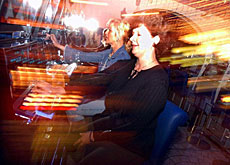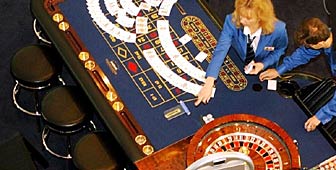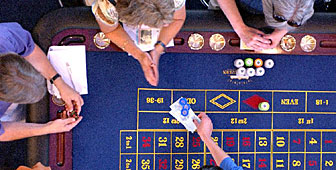Experts warn of rise in gambling addiction

One year after the first of seven Grand Casinos opened in Switzerland, help groups are warning of a steady rise in the number of gambling addicts.
They say many addicts run up debts of least SFr50,000 ($37,000) before seeking help.
The first new casino opened in the city of Lucerne last June and was followed by Bern, Baden, Lugano and Montreux. The final two – in Basel and St Gallen – are due to open later this year.
Operators of these so-called Class A casinos are under no obligation to impose an upper limit on bets placed at the tables.
Self-help groups say the launches coincided with an upturn in people seeking counselling to beat their addiction.
“In the second half of last year, we saw a significant rise in the number of enquiries relating to gambling addiction,” explains Heidi Fritschi, director of Berner Gesundheit, a counselling centre for gambling addicts in the Swiss capital.
Seeking help
Claudia Roth, one of Fritschi’s team of professionally-trained counsellors, told swissinfo it was still too early to tell whether the increase could be directly attributed to the opening last July of Bern’s new Grand Casino.
But she made it clear that the centre is working closely with casino managers to ensure that addicts seek help before it is too late.
“We have an agreement with the casino [in Bern] that if they notice someone in trouble at the tables, trained staff will go up to this person, and put them in touch with us,” Roth told swissinfo.
“But they only come if they want to be helped. Mostly we find that people don’t recognise they’re addicted.”
Barred
Legislation drawn up by the Federal Gaming Board stipulates that all casinos awarded a Class A licence must do all they can to prevent gamblers playing above their means.
The board can impose fines of up to SFr500,000 on operators who do not abide by the rules and let someone who has been barred from playing return to the tables.
Stefan Harra, director of the Grand Casino in Bern, told swissinfo his staff are trained to watch out for customers who get into trouble.
“It’s simply not in our long-term interest to let addicts play in our casino,” Harra says.
Gambling debts
But Roth believes many addicts fall through the legal safety net and are left to play until they run out of money, with only a few finding their way to self-help groups.
“The people who do make it here know they have to stop in their minds, but they don’t really feel like doing so,” Roth explains. “So my task is to motivate them.”
Most of those who seek help, adds Roth, have already run up debts of least SFr50,000 by the time they arrive for the first session of counselling.
“It’s very important to work with them to manage their finances, because they need to have a sense that the debt can be reduced.”
“Many people are desperate, some are suicidal, because they’ve lost their jobs and relationships and they have no prospects for the future.”
Reformed addict
One of Roth’s clients at the counselling centre is “Andreas” (whose name has been changed to protect his identity), a 46-year-old reformed addict from Bern, who ran up hundreds of thousands of francs in debts.
Andreas told swissinfo he began by spending “small change, something like twenty to fifty francs” in slot machines, but soon became addicted to more high-stakes gambling, regularly spending SFr6000 in a single night at the tables.
“It got to the stage when I couldn’t walk out of the house with any money in my pocket, because…after a couple of minutes, all I would be able to think about would be when I could go and play,” he recalls.
“I realised I had a serious problem and this wasn’t good for my family life. They saw that I couldn’t handle it and that the problem was bigger than me.”
Andreas is not alone: the Swiss Casinos Social Advisory Board – a body funded by casino operators – estimates that between 10,000 and 20,000 people in Switzerland are addicted to gambling.
According to the Lucerne-based self-help centre, Careplay, an overwhelming majority of addicts are male.
Families suffer
Roth points out that close family members also suffer the consequences of a gambler’s addiction.
“Sometimes, I have wives of addicts who come to me and say they have nothing left in their cupboards to eat and they don’t even have enough money to pay for rent, health insurance and food.”
Andreas says he has now beaten his addiction and that he is no longer attracted to the high-stakes gambling opportunities on offer inside Switzerland’s new breed of Grand Casinos.
“It’s just you against the system inside the slot machine,” he explains. “In the beginning, you think you can beat it – I was standing in front of it saying, ‘I’ll show you’.”
“But I realised that in the end, it’s the system that always wins.”
swissinfo, Ramsey Zarifeh
In 2001, the Swiss government awarded so-called Class A licences to seven casinos, all of which are allowed to operate with no upper limit imposed on bets.
The first of these opened in Lucerne in June 2002, while the last two will open in Basel and St Gallen in the autumn.
Swiss casino operators can be fined up to SFr500,000 for letting gamblers who have been barred from playing return to the tables.

In compliance with the JTI standards
More: SWI swissinfo.ch certified by the Journalism Trust Initiative


You can find an overview of ongoing debates with our journalists here. Please join us!
If you want to start a conversation about a topic raised in this article or want to report factual errors, email us at english@swissinfo.ch.